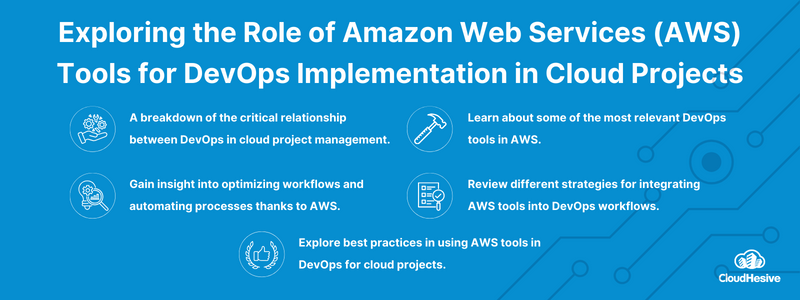Integrating DevOps best practices into cloud projects presents a few inherent challenges. With the help of AWS Tools for DevOps, processes can be streamlined for better cloud project management.

With the goal of improving an organization’s ability to develop applications, DevOps considers numerous facets of the development process. Regarding cloud project management, the technology’s benefit speaks for itself. However, due to the technology’s capabilities, managing cloud projects can involve vast amounts of information. In some cases, the data is so extensive that it simply can’t be managed manually.
Thankfully, we’re in an era where a manual approach to cloud project management isn’t needed. With the help of Amazon Web Services (AWS), developers can simplify project management in cloud tech while improving efficiency, speed to market, and more.
One of AWS’s most significant benefits is its capabilities and the extensive suite of tools found underneath. Several offer direct contributions to cloud project management, offering comprehensive solutions alongside a bird’s eye view of every project.
Although there are plenty of resources regarding cloud project management, developers must focus on what will serve their development needs the most.
Key AWS Tools for DevOps in cloud projects
Cloud technology has advanced significantly in recent years and has positively impacted DevOps. The flexible nature of AWS Tools is seemingly never-ending, with core focal points relevant to development teams, such as continuous integration, delivery, and growth.
Organizations that use DevOps practices have the chance to become increasingly competitive while meeting expanding consumer demands. However, there’s plenty of wiggle room with AWS Tools, and a few have standout benefits for DevOps.
- AWS CodePipeline
Focusing on continuous integration and delivery, AWS Code Pipeline helps automate the process of building, testing, and deploying code. The tool is a go-to solution in DevOps as it provides reliable update efficacy to infrastructure and applications. It also follows customizable release process models, making it one of the fastest options for delivering new updates and features. - AWS CodeBuild
Compile source code, generate deployable software, and execute tests, all without the need for traditional hurdles such as scaling, provisioning, or managing build servers. This is the beauty of what can happen when cloud technology and DevOps practices come together. In short, AWS CodeBuild deals with concurrent processing of multiple bands and continuous scaling without queue delays. - AWS CodeDeploy
By utilizing AWS CodeDeploy, DevOps teams can automate code deployment to various instances. This helps streamline the release of new features while mitigating risks like downtime during deployment. It also allows code deployment to Amazon EC2 instances and on-premise servers.
Knowledge of these tools is one thing, but integration still requires some planning. AWS Tools are efficient, but the right strategy can optimize how you implement them into DevOps practices.
Optimizing cloud project delivery with AWS DevOps tools
The list of benefits from AWS Tools is extensive, but tools that focus on DevOps bring core solutions that developers need more than ever. Cloud project delivery considers more than the end goal, as each process step is essential to a successful outcome. DevOps teams can optimize cloud project delivery through AWS Tools thanks to the primary use cases they offer.
For example, AWS DevOps tools can optimize project delivery in the following ways:
- Widespread automation capabilities
- Improvements in scalability
- Ongoing integration and deployment
- Mitigating potential risks with downtime
Even if some of these points seem minor, developers know one hiccup in the cloud project timeline, and everyone suffers. You can find numerous tricks on AWS Tools for DevOps, and developers have the flexibility on how they want to take effective DevOps implementation in a better direction.
Best practices for using AWS Tools in DevOps
This article focuses on a relatively niche aspect of AWS Tools for DevOps, but it’s essential to highlight the true strength of what AWS is capable of. Best practices in DevOps with the help of AWS Tools also include the benefit of simplified monitoring, security, and cost management.
DevOps teams can easily monitor applications through Amazon CloudWatch, including projects on-premises and other clouds. Security can also be managed more comprehensively by integrating Amazon Config, which focuses on auditing, assessing, and evaluating resource configuration. In turn, DevOps teams can enable and improve the efficacy of security and governance.
Tackling cloud project management through modern DevOps practices is also bound to help with cost management in more ways than one. Historically, issues with downtime, product updates, and speed to market cost software organizations a staggering amount of money. This is partly why effective DevOps implementation in cloud project management requires a forward-thinking approach today.
Your journey with AWS Tools for DevOps
The tech world is experiencing a consistent learning curve with cloud technology as its capabilities are expanding rapidly. This article provides a direct guide on how teams can apply AWS Tools to DevOps for better cloud project management.
For a first-hand look at many of these DevOps practices in effect, don’t hesitate to check out a few of our case studies on the CloudHesive website. Of course, if you need additional guidance on AWS Tool and DevOps implementation, we’re just a click away from a one-on-one conversation.



